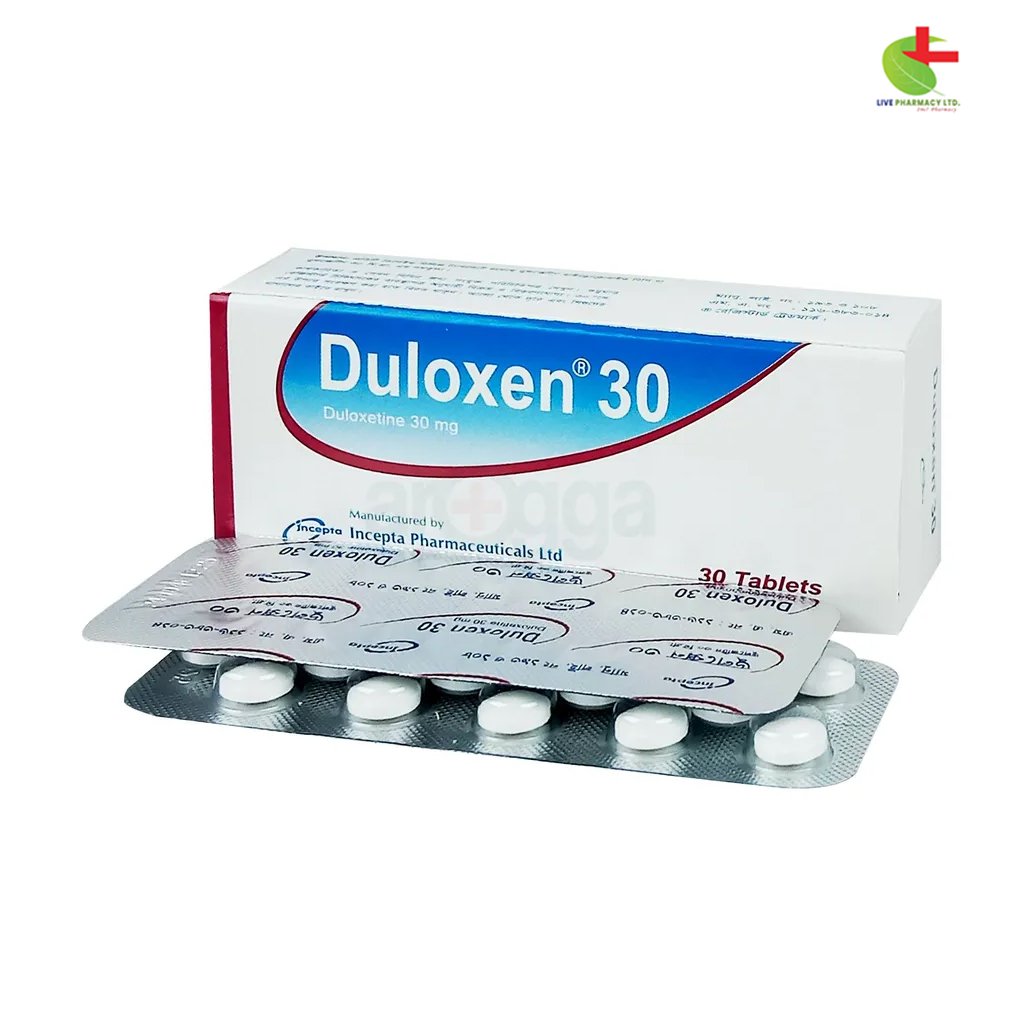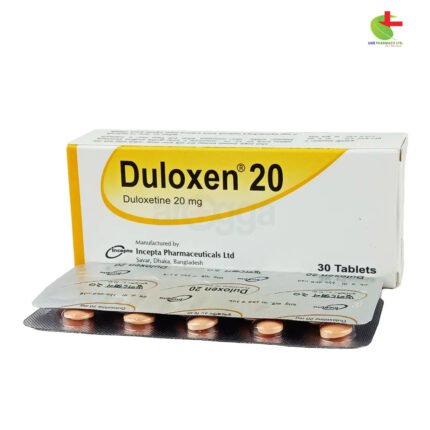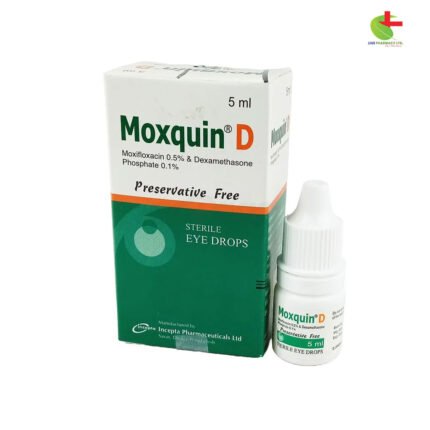Duloxen 30
120.00৳ Strip
- Duloxen is a serotonin and norepinephrine reuptake inhibitor (SNRI).
- Indicated for Major Depressive Disorder, Generalized Anxiety Disorder, Diabetic Peripheral Neuropathic Pain, Fibromyalgia, and Chronic Musculoskeletal Pain.
- Works by enhancing serotonin and norepinephrine levels in the brain.
- Always consult a healthcare professional for appropriate dosing and guidance.
- Store below 30°C, away from light, and out of reach of children.
 Brand
Brand
|
Incepta Pharmaceuticals Ltd |
|---|---|
 Generics
Generics
|
Duloxetine Hydrochloride |
 Type
Type
|
Tablet |
Indications
Duloxen is a serotonin and norepinephrine reuptake inhibitor (SNRI) indicated for the management of:
- Major Depressive Disorder (MDD)
- Generalized Anxiety Disorder (GAD)
- Diabetic Peripheral Neuropathic Pain (DPNP)
- Fibromyalgia
- Chronic Musculoskeletal Pain
Always consult a registered healthcare professional before use.
Pharmacology
Duloxetine Hydrochloride is an oral selective serotonin and norepinephrine reuptake inhibitor (SSNRI). It has a minor inhibitory effect on dopamine reuptake and shows minimal affinity for various receptors, including adrenergic, cholinergic, and GABA receptors. Duloxetine does not inhibit monoamine oxidase (MAO) and is primarily metabolized in the liver.
Dosage & Administration
- Major Depressive Disorder (MDD):
- Starting Dose: 40-60 mg/day
- Target Dose: 40 mg/day (20 mg twice daily) to 60 mg/day (once daily)
- Maximum Dose: 120 mg/day
- Generalized Anxiety Disorder (GAD):
- Starting Dose: 60 mg/day
- Maximum Dose: 120 mg/day
- Diabetic Peripheral Neuropathic Pain (DPNP):
- Starting Dose: 60 mg/day
- Maximum Dose: 60 mg/day
- Fibromyalgia & Chronic Musculoskeletal Pain:
- Starting Dose: 30 mg/day
- Maximum Dose: 60 mg/day
Consult a registered healthcare professional for dosing advice.
Interactions
Duloxen’s metabolism involves CYP1A2 and CYP2D6 isozymes. Co-administration with potent CYP1A2 inhibitors like fluvoxamine can increase Duloxen levels. Avoid combinations with other drugs affecting these enzymes, as they may alter plasma concentrations.
Contraindications
Duloxetine is contraindicated for individuals with known hypersensitivity to the drug, bipolar depression, significant alcohol use, or chronic liver disease. Caution is advised for those with narrow-angle glaucoma.
Side Effects
Common side effects include nausea, dizziness, dry mouth, and constipation. Rare effects may involve increased blood pressure and seizures. Severe overdose can lead to life-threatening cardiac arrhythmias.
Pregnancy & Lactation
Duloxetine is categorized as Pregnancy Category C. Its use during pregnancy should be based on a careful risk-benefit analysis. The effects on lactation are unknown, and nursing while on Duloxetine is not recommended.
Precautions & Warnings
Patients should be monitored for clinical worsening, suicidality, and unusual behavior changes, particularly during the initial treatment phase. Blood pressure should be monitored regularly, especially if combined with NSAIDs or anticoagulants.
Use in Special Populations
Safety and efficacy in pediatric patients have not been established.
Overdose Effects
In the event of an overdose, general supportive measures should be employed. There is no specific antidote for Duloxen, and gastric lavage may be indicated if performed shortly after ingestion.
Therapeutic Class
Serotonin-norepinephrine reuptake inhibitor (SNRI)
Storage Conditions
Store below 30°C, away from light and out of reach of children.













Reviews
There are no reviews yet.